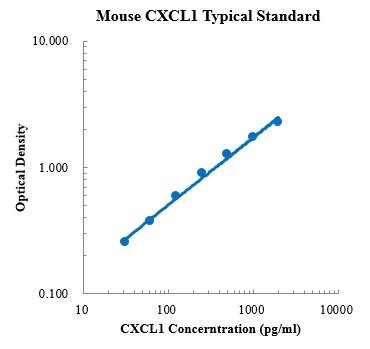Mouse CXCL1/KC Enzyme Immunoassay Kit
Min.Order : 1 Pieces Quick Quotation >
Conpany Profile
Product Details

| Brand | MultiSciences |
| CatNum | 70-EK296 |
| ProductName | Mouse CXCL1/KC ELISA Kit |
| CustomsName | Mouse CXCL1/KC ELISA Kit |
| Application | ELISA |
| Reactivity | Mouse |
| Assay Type | Sandwich ELISA |
| Suitable Sample Type | serum, plasma, cell culture supernates |
| Format | 96-well strip plate |
| Storage | 4? (unopened) standard stored at -20?, others stored at 4? (opened) |
| Shipping Condition | 4? |
| Sample Volume | 20 µl |
| Sensitivity | 0.47 pg/ml |
| Standard Curve Range | 31.25 - 2000 pg/ml |
| Spike Recovery Range | 91 % - 107 % |
| Mean Spike Recovery | 0.98 |
| CV of Intra plate | 3.9 % - 5.6 % |
| CV of Inter plate | 4.4 % - 5.9 % |
| Components | 96-well polystyrene microplate coated with a monoclonal antibody against CXCL1 Mouse CXCL1 Standard, lyophilized CXCL1 Detect Antibody Standard Diluent Streptavidin-HRP Assay Buffer (10×) Substrate (TMB) Stop Solution Washing Buffer (20×) Plate Covers |
| Describtion | This assay employs the quantitative sandwich enzyme immunoassay technique for the quantitative detection of mouse CXCL1. The Mouse CXCL1/KC ELISA is for research use only. Not for diagnostic or therapeutic procedures. Chemokine (C-X-C motif) ligand 1 (CXCL1), also known as KC or N51, is a small cytokine belonging to the CXC chemokine family. It was originally identified in fibroblasts as a PDGF-induced immediate early gene that encodes a secretory protein of approximately 8 kDa. CXCL1 is expressed by macrophages, neutrophils and epithelial cells, and has neutrophil chemoattractant activity. CXCL1 plays a role in spinal cord development by inhibiting the migration of oligodendrocyte precursors and is involved in the processes of angiogenesis, inflammation, wound healing, and tumorigenesis. CXCL1 is induced by inflammatory cytokines such as IL-1 and TNF, and IL-17A enhances expression of CXCL1 by prolonging the half-life of its constitutively unstable mRNA. An initial study in mice showed evidence that CXCL1 decreased the severity of multiple sclerosis and may offer a neuro-protective function. |
Recommend Product